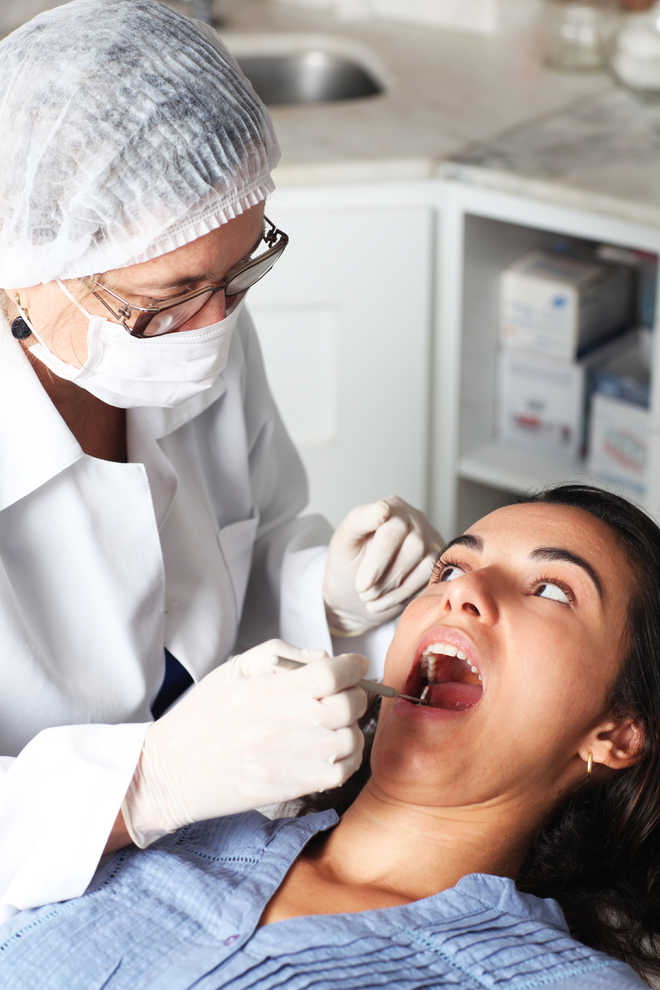Take the teeth out of diabetes
Dr Bhumika Madan
Oral and dental health is one of the most neglected and overlooked aspects of general well-being because poor oral health primarily affects morbidity rather than mortality. But nonetheless it's taken a as a form of 'silent epidemic' which needs to be attended to on a priority basis.
An oral cavity is a mirror of the human body. A majority of the systemic illnesses are reflected through the oral cavity.
Not many people would be aware that Diabetes Mellitus, commonly referred to as diabetes, can have its roots in periodontal problems. Diabetes is a complex metabolic disorder characterised by chronic hyperglycaemia. There are two major types of diabetes, Type 1 and Type 2. Type 2 diabetes mellitus is the most common form of diabetes accounting for more than 90 per cent of the cases.
India has the second highest number of diabetes cases at 70 million after China. The number of diabetes patients in the country is likely to go up to 120 million in next 20 years, according to figures by Indian Institute of Public Health (IIPH).
While there are many general symptoms, including increased thirst and frequent urination, unexplained fatigue, inexplicable weight loss, slow-healing sores or wounds, increased hunger, blurred vision, areas of darkened skin, there can be numerous oral changes as well in diabetic patients. These can include cheilosis (inflammation of one or both corners of the mouth), mucosal drying and cracking, burning mouth and tongue and reduced salivary flow. The influence of diabetes on the periodontium has been thoroughly investigated in many studies.
Early-stage periodontal disease (gingivitis) is seldom painful and occasionally may lead to swollen, red and bleeding gums. However, longstanding, untreated gingivitis may progress to periodontitis, a serious infection that destroys the soft tissue and bone that supports the teeth, and may cause tooth loss over the years.
As the disease progresses, following symptoms might occur:
-Swollen, bright red or purple gums.
-New spaces developing between your teeth.
-Loose teeth or a change in the way your teeth fit together when you bite.
-Pus between your teeth and gums.
-Persistent breath odour or a bad taste in your mouth.
-Gums that feel tender when touched.
-Gums that pull away from your teeth (recede), making your teeth look longer than normal.
This periodontal infection makes blood glucose level harder to control as infection anywhere in the body can raise the glucose levels in blood.
Periodontal disease and diabetes have always been inter-linked. Type 2 diabetes, the most common kind of diabetes can remain undiagnosed for years because hyperglycemia appears gradually and often without symptoms.
In various studies conducted over the years, almost all evidence points towards the fact that diabetes exponentially increases the risk of developing periodontitis. A risk analysis showed that the people with Type 2 diabetes had approximately three-fold increased risk of suffering from periodontitis compared with people without diabetes.
The risk of developing periodontitis was significantly greater in patients with diabetes who had poor glycemic control than in patients with well controlled diabetes. The increased glucose in the gingival fluid and blood of diabetic patients could change the environment of the microbial flora, that could contribute to the severity of periodontal disease observed in patients with poorly controlled diabetes.
Dentists have long been aware of the importance of diagnosis of diabetes in their patients. Diabetic patients have reduced defence mechanisms and the increased susceptibility to infection leads to destructive periodontal disease. In fact, periodontal disease is considered to be the sixth complication of diabetes.
Severe gingival inflammation, deep periodontal pockets, rapid bone loss etc are also often associated with diabetic patients. Many medical conditions, particularly diabetes, predispose patients to development of more severe and progressive forms of periodontal disease.
Although glycemic control is probably the most important component in maintenance of good oral health in individuals with diabetes, but a regular dental check up every six months can catch early signs of diabetes and will be very helpful toward achieving improved overall oral and systemic health.
The writer is senior consultant, dentistry, Aakash Healthcare, New Delhi









